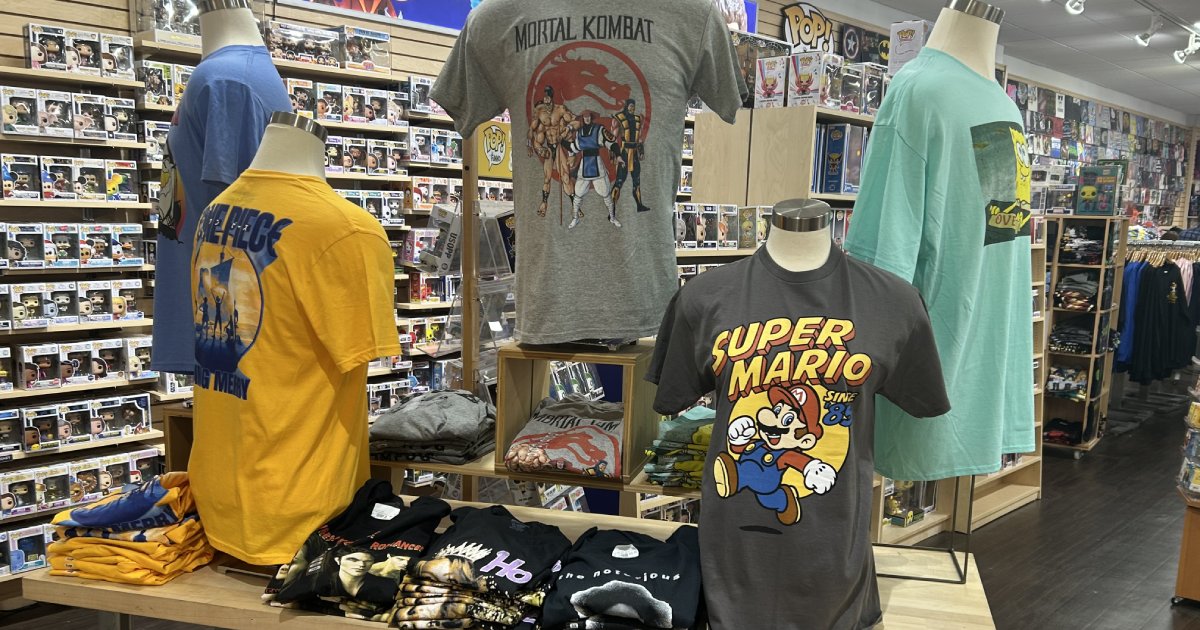
Pop Culture Retailers Remain on Trend
By Mark Seavy
As pop culture continues to diversify, the number of retailers catering to fans of every brand continues to grow.
And unlike many retailers, which stake out standalone locations, pop culture chains (including the likes of Hot Topic, Spencer’s, FYE, Newbury Comics, Box Lunch, Showcase, and It’Sugar) tend to appear in clusters. In a mall in Danbury, CT, for example, FYE, Newbury Comics, Hot Topic, and Showcase all share space—without apparent customer overlap. For example, Newbury moved earlier this year into a mall in Syracuse, NY that is already home to FYE.
That doesn’t mean the chains don’t compete. FYE and Hot Topic both carry Funko exclusives, for example. Yet the chains seem to coexist because of the broad assortment of licensed IPs available, and the fact that they deploy a wide mix of exclusive products and DTRs.
Showcase, for example, claims that 70% of its products are exclusive and that it can deliver items from concept to store shelves within 53 days. In the case of Netflix’s Squid Game, Dalgona cookies were available in stores 16 days after the series’ rise in popularity. Showcase also focuses on TikTok-inspired trends and its #showcasemademebuyit hashtag has 279 million views and 645,000 followers on the social media platform. The 150-store Toronto-based chain expanded into the U.S. during the past two years, where it now has 41 locations.
FYE and Hot Topic are known for DTRs, as is Spencer’s (specifically around costumes and its Spirit Halloween seasonal chain). The 207-store FYE, which launched in 1993 as the For Your Entertainment pop culture division of former Trans World Entertainment, and Newbury both carry music, including vinyl. And 31-store Newbury, which was founded in 1996, has a broad selection of comic books and also boasts a housewares section. Several of these chains carry anime, but one might focus on Naruto while another targets Dragon Ball Z.
“They really work hard to differentiate themselves and they do a good job of it,” said Matthew Kavet, President of licensed candy, energy drink, and soda supplier Boston America, which does business several pop culture chains and is readying a Barbie soda for 2024. “Through DTRs and licensing exclusives, they give their customers a reason to visit the stores repeatedly. Hot Topic brings in an item, blows it out, and moves on because the customer needs to see something different. They can’t just continue an item.”
That continuous need for fresh merchandise leads to an intense focus on trends and consumer viewing habits, gleaned through social media and other means. Many times, a new property starts out in t-shirts and, if it proves popular, retailers expand the property to other categories, licensing executives said.
Unlike mass retailers, specialty store buyers tend to make purchases across multiple product categories rather than one, lending to a wider assortment of licensed merchandise. The specialty store buyers also tend to be pop culture fans themselves, adding gravitas to purchase orders. And while unit sales may be smaller at the specialty chains than at larger retailers, suppliers are playing to a targeted audience.
“These are very savvy buyers that have their pulse on trends,” said a licensing executive. “And products might not turn as quickly as at mass retailers. But an item that sells a unit or two a week can be considered successful [at specialty chains], while at a mass retailer it might be considered a disaster.”
As these retailers expand— perhaps more conservatively than other channels—the question that remains is whether they will reach a saturation point and consolidate. But as some licensing executives point out, significant consolidation has already occurred among specialty retailers. Trans World Entertainment bought up Suncoast Motion Picture Co., Coconuts, Strawberries, Sam Goody, and others video and music chains. Onetime video rental giant Blockbuster also purchased its rivals, including Erol’s, Record Bar and U.K.-based Ritz, before filing for bankruptcy in 2010 and selling its assets the following year to Dish Network.
“With these specialty retailers, everybody can tell a different retail story and be successful,” said Matthew Hoffman, CEO of Uncanny Brands, which will launch popcorn poppers, waffle makers, and other items under Disney Classic brands like Winnie the Pooh in 2024. “The customer for Hot Topic is different from Box Lunch, which is different from Spencer’s. If they are curating their assortment and there isn’t sameness, there is business for all of them. But it is important now more than ever that these retailers have exclusive, unique products because that is the only way it works. Otherwise, I am going to go on my phone and find the same stuff.”

















